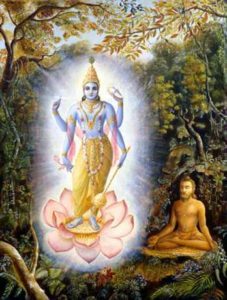The sanskrit word Samadhi has different meanings. Let’s see some of them.
First case:
Samadhi may be divided in two words: sama (same) and dhi (intelligence).
When departing this world, the pure devotee has reached the same qualitative level of his Deity and also the same mood.
Second case:
In his Krishna Book Srila Prabhupada defines samadhi in this way:
“Samadhi means absorption of all the activities of the senses in a particular object, and the gopis indicate that the pastimes of Krsna are the perfection of all meditation and samadhi.”
Third case:
Samadhi, which may be translated as “directing together” is the state where the transcendentalist realize his being spirit soul and not the material body. Therefore all his senses are “directed together” toward the Supreme Personalities of Godhead and His eternal abode.
More cases:
Sanskrit scholars give us various hints on the possible interpetations on the word samadhi, by which we can understand more philosophical concepts.
sam, “together”; a, “toward”; stem of dadhati, “puts, places”: “a putting or joining together;”
sam, “together” or “integrated”; ā, “towards”; dhā, “to get, to hold”: “to acquire integration or wholeness, or truth” (samāpatti in buddhist philosophy);
sam, “uniformly” or “fully”; adhi, “to get established”: a state wherein one establishes himself to the fullest extent in the Supreme Krishna consciousness;
samā, “even”; dhi, “intellect”: a state of total equilibrium of a detached intellect.
sam, “perfect,” “complete.” dhi, “consciousness”: a state of being where “all distinctions between the person who is the subjective meditator, the act of meditation and the object of meditation merge into qualitative oneness.”
sama, “equanimous” dhi,”buddhi or the intellect”.
There are different kinds of samadhi. One can even be in samadhi and yet be awake to the material world (jagra-samadhi).
Manonatha Dasa (ACBSP)
15 dic 2019
Post view 1183 times




Leave a Reply